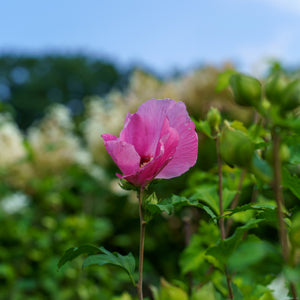'Aphrodite' Rose of Sharon: A Blooming Goddess
Welcome to this week’s edition of our "Plant of the Week" series! We're excited to feature the Aphrodite Rose of Sharon (Hibiscus syriacus 'Aphrodite'), a stunning flowering shrub that is sure to elevate the beauty of any garden. Known for its captivating pink blooms with a striking red eye at the center, this plant offers a tropical flair that belies its hardy nature. Named after the Greek goddess of love and beauty, the Aphrodite Rose of Sharon lives up to its namesake with its vibrant flowers and lush green foliage, making it a beloved choice among gardeners and landscape enthusiasts. Whether you're looking to add a touch of color to your garden beds or seeking a standout specimen for your landscape, the Aphrodite Rose of Sharon is a versatile plant that delivers beauty, resilience, and charm in spades.
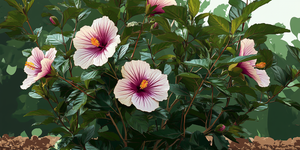
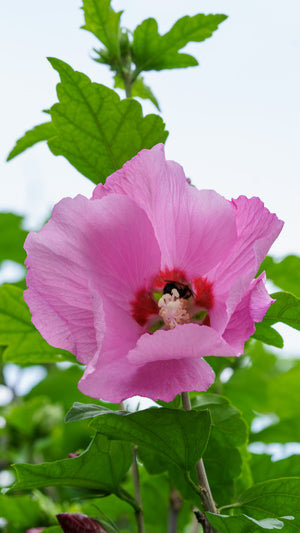
What Makes Aphrodite Rose of Sharon Special?
The Aphrodite Rose of Sharon stands out for its remarkable floral display and its ability to bloom profusely even in the heat of summer when many other plants have faded. The plant’s medium to large pink flowers, each adorned with a deep red eye at the center, are a sight to behold. These hibiscus-like blooms are not only large but also numerous, covering the shrub in a blanket of vibrant color from midsummer to the first frost. The foliage of the Aphrodite Rose of Sharon is equally attractive, with its dark green leaves providing a lush backdrop to the vivid flowers.
Another distinguishing feature of this shrub is its adaptability. The Aphrodite Rose of Sharon is remarkably hardy, capable of thriving in a variety of soil types and conditions, including urban environments where pollution can be a concern. It is also tolerant of heat, humidity, and drought, making it a reliable performer in challenging climates. Additionally, this shrub is relatively pest and disease-resistant, reducing the need for constant maintenance and making it an excellent choice for busy gardeners.
The Aphrodite Rose of Sharon also boasts a long bloom period, extending the garden’s visual appeal well into the fall. This prolonged blooming season, combined with its ability to attract pollinators like bees, butterflies, and hummingbirds, makes it a valuable addition to any garden that prioritizes both beauty and ecological benefits. Whether used as a hedge, a specimen plant, or part of a mixed border, the Aphrodite Rose of Sharon brings a dynamic and enduring element of color and life to the landscape.
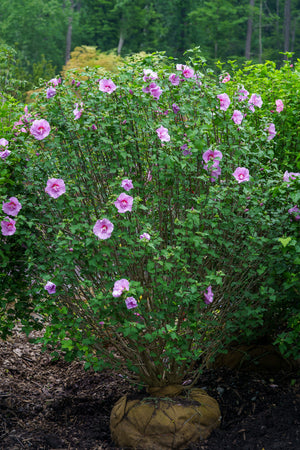
What is Aphrodite Rose of Sharon Used For?
The Aphrodite Rose of Sharon is a versatile plant that can be utilized in various landscape designs and garden settings, offering both aesthetic and practical benefits. Here are some of the key uses for this stunning shrub:
Ornamental Beauty: The most obvious use of the Aphrodite Rose of Sharon is as a beautiful ornamental plant. Its vibrant pink flowers with a deep red center create a striking visual effect, making it a perfect choice for adding color and interest to garden beds, borders, and landscapes. The plant’s upright growth habit and profuse blooming make it a standout feature in any garden.
Hedges and Screens: Thanks to its dense foliage and tall growth (up to 8-12 feet), the Aphrodite Rose of Sharon can be used to create attractive hedges and privacy screens. Planted in a row, these shrubs can form a natural barrier that not only provides privacy but also adds beauty and structure to the garden.
Specimen Planting: As a specimen plant, the Aphrodite Rose of Sharon can serve as a focal point in the landscape. Whether planted alone or in groups, its showy flowers and lush foliage draw attention and enhance the overall aesthetic of the garden. Its adaptability to various soil types and conditions makes it a reliable choice for prominent garden locations.
Attracting Pollinators: The flowers of the Aphrodite Rose of Sharon are known to attract a variety of pollinators, including bees, butterflies, and hummingbirds. By incorporating this shrub into your garden, you can support local pollinator populations and promote a healthy, biodiverse ecosystem.
Urban Landscaping: Due to its tolerance for pollution and ability to thrive in less-than-ideal soil conditions, the Aphrodite Rose of Sharon is an excellent choice for urban gardens and city landscapes. Its resilience makes it ideal for planting in areas where other plants might struggle, such as along streets, in parking lot islands, or in other urban settings.
Cut Flowers: The large, showy blooms of the Aphrodite Rose of Sharon make excellent cut flowers. They can be used to create stunning floral arrangements, bringing the beauty of the garden indoors.
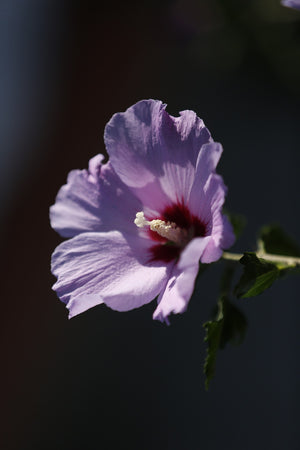
How to Care For Aphrodite Rose of Sharon
Caring for the Aphrodite Rose of Sharon is relatively simple, making it a great option for both novice and experienced gardeners. Here are the key aspects of care to ensure your shrub thrives:
Planting: The Aphrodite Rose of Sharon thrives in full sun to partial shade, though it blooms most profusely when planted in full sun. It is adaptable to a wide range of soil types but performs best in well-drained, loamy soil. When planting, dig a hole twice the width of the root ball and just as deep. Place the plant in the hole, backfill with soil, and water thoroughly to settle the soil around the roots.
Watering: Regular watering is essential, especially during the first growing season as the plant establishes its root system. Once established, the Aphrodite Rose of Sharon is fairly drought-tolerant, but it will benefit from consistent moisture during dry periods. Water deeply and less frequently rather than shallow and often to encourage deep root growth. Be careful not to overwater, as this can lead to root rot.
Pruning: Pruning the Aphrodite Rose of Sharon is crucial to maintaining its shape and promoting healthy growth. The best time to prune is in late winter or early spring before new growth begins. Prune back to 2-3 buds per branch to encourage a fuller, bushier plant and remove any dead or damaged branches. Regular pruning also helps to control the size and shape of the shrub, preventing it from becoming too leggy or unruly.
Fertilizing: Feed the Aphrodite Rose of Sharon with a balanced, slow-release fertilizer in the spring to support healthy growth and abundant blooms. Avoid over-fertilizing, as this can lead to excessive foliage growth at the expense of flowers. A light application of compost or organic matter in the spring can also help improve soil fertility and structure.
Mulching: Apply a layer of organic mulch around the base of the plant, leaving a gap around the stem to prevent moisture buildup. Mulching helps conserve soil moisture, suppress weeds, and regulate soil temperature, all of which contribute to the health and vigor of the plant.
Protection: While generally hardy, the Aphrodite Rose of Sharon can benefit from some winter protection in colder climates. Mulch heavily around the base of the plant to insulate the roots, and consider using a protective wrap or burlap for young plants or those in exposed locations to shield them from harsh winter winds and frost.
By following these care guidelines, your Aphrodite Rose of Sharon will thrive, providing you with years of vibrant blooms and lush foliage that enhance the beauty and appeal of your garden.
CONCLUSION
The Aphrodite Rose of Sharon (Hibiscus syriacus 'Aphrodite') is a versatile and resilient shrub that adds a splash of color and a touch of tropical elegance to any garden. With its striking pink flowers, extended blooming period, and easy care requirements, it’s an ideal choice for gardeners looking to enhance their landscapes with minimal effort. Whether used as a hedge, a focal point, or a pollinator-friendly addition to the garden, the Aphrodite Rose of Sharon delivers beauty, charm, and ecological benefits in abundance. With proper care and attention, this remarkable plant will reward you with its stunning floral display year after year, making it a cherished addition to your outdoor space.

